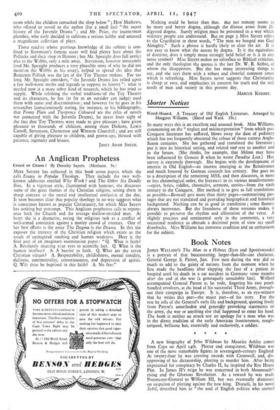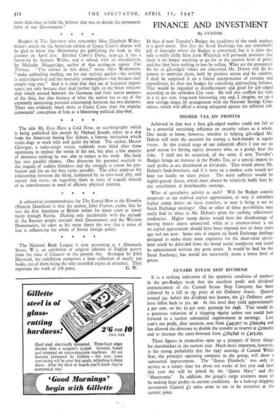Book Notes
JAMES WELLARD'S The Man in a Helmet (Eyre and Spottiswoode) is a portrait of that buccaneering, larger-than-life-size character, General George S. Patton, Jun. Few men during the war did so much to add to the gaiety of nations, from the moment when he first made the headlines after slapping the face of a patient in hospital until his death in a car accident in Germany some months after the end of the war (a grotesquely unsuitable fate). Wellard accompanied General Patton as he rode, fingering his two pearl- handled revolvers, at the head of his successful Third Army, through- out their campaign in Europe. It is, therefore, as an eye-witness that he writes this part—the major part—of his story. For the rest he tells of the General's early life and background, quoting freely from Patton's unorthodox and generally 'provoking statements on the army, the war or anything else thii happened to enter his head. The book is neither an attack nor an apology for a man who was in the direct tradition of the early American frontiersmen, rough- tongued, bellicose but, essentially and exclusively, a soldier.
A new biography of John Wildman by Maurice Ashley comes from Cape on April 14th. Plotter and conspirator, Wildman was one of the most remarkable figures in seventgenth-century England. At twenty-four he was crossing swords with Cromwell, and, dis- approving of his dictatorship, plotting to murder him. After being imprisoned for conspiracy by Charles II, he inspired the Rye House Plot. In James II's reign he was concerned in both Monmouth's rising and the Glorious Revolution. - As a reward he was made Postmaster-General to William III, but was eventually dismissed on suspicion of plotting against the new king. Disraeli, in his novel Sybil, described him as "the soul of English politics who seemed more than once to hold the balance that was to decide the permanent form of our Government."
Readers of The Spectator who remember Miss Elizabeth Wiske- mann's article on the American edition of Count Ciano's diaries will be glad to know that Heinemann are publishing the book in this country on April mt. Entitled Ciano's Diary, 1939-43, it has a foreword by Sumner Welles, and is edited, with an introduction, by Malcolm Muggeridge, author of that astringent survey The Thirties. "The entries in this diary," wrote Miss Wislcemann, "make enthralling reading, not for any stylistic quality—the writing is undistinguished and the mentality commonplace—but because they simply ring true." And it is clear that they are of historical impor- tance, not only because they shed further light on the bitter relation- ship which existed between the Germans and their junior partners of the Axis, but also because of what the author has to say of the extremely interesting personal relationship between the two dictators. There was evidently much more to Count Ciano than the popular cartoonists' conception of him as a blustering political play-boy.
* * * The title My Eyes Have a Cold Nose, an autobiography which is being published this month by Michael Joseph, refers to a dog from the American Seeing Eye School, a famous institution which trains dogs to work with and guide the blind. The author, Hector Chevigny, a radio-script writer, suddenly went blind after three operations to replace the retina of his eye, but after a few months of intensive training he was able to return to his work. His book has two parallel themes. One discusses his personal reaction to the tragedy of sudden blindness and the struggle to renew his pro- fession and life on the best terms possible. The other analyses the relationship between the blind, hampered by an unwanted pity, and society that insists on regarding them as cases of tragedy instead of as convalescents in need of efficient physical training.
* A substantial recommendation for The Scared Men in the Kremlin (Hamish Hamilton) is that the author, John Fischer, claims that he was the first American or British writer for many years to travel freely through Russia. Dealing only incidentally with the attitude of the Russian people towards their Government and the Western Democracies, he takes as his main thesis the way that a sense of fear is influencing the whole of Soviet foreign policy.
The National Book League is now presenting at 7 Albemarle Street, W. i, an exhibition of original editions of English poetry from the time of Chaucer to the present day. Arranged by John Hayward, the exhibition comprises a loan collection of nearly 350 books, ten of them being the only recorded copies in existence. They
represent the work of 278 poets. G. W.



































 Previous page
Previous page